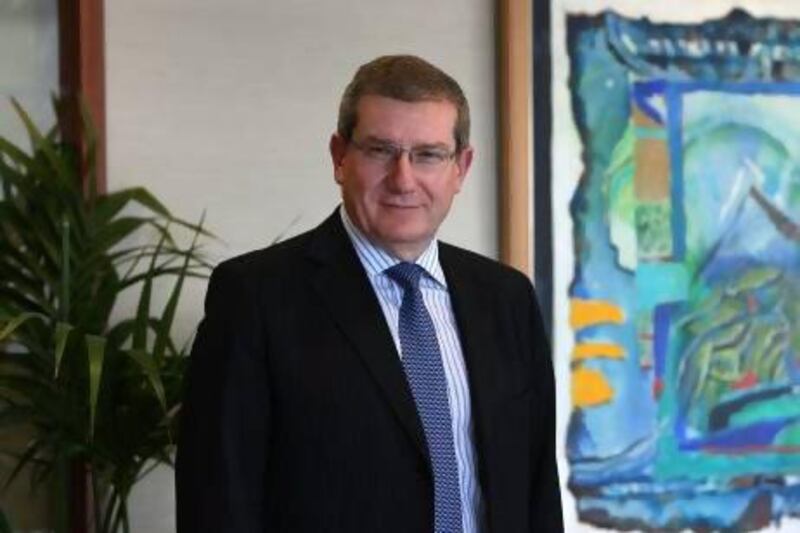The big business families of the UAE are said to be facing a generational time bomb. It is part of Iyad Malas's job to show how they can defuse it.
The chief executive of Majid Al Futtaim Holding (MAF), the Dubai-based malls and hotels operator, is managing a challenge familiar to many of the Emirates' business dynasties.
Most began their corporate lives around the time of independence in 1971, typically with a dynamic and entrepreneurial founder who saw the opportunities of the new country and who worked with the ruling families to deliver economic growth.
In the process, they helped the Emirates on the path to modernisation and development, and of course enriched themselves.
Now, the founders are ready to hand over to the next generation. The challenge is to find the right model of corporate organisation for the next 40 years and beyond, and the executives to run it.
Mr Malas says his company is still "very much family owned, but the shareholder always wanted to professionalise the business, and that's what we're doing".
The shareholder in this context is the eponymous Majid Al Futtaim, whose family have been at the heart of commercial life in Dubai for many decades, long before the UAE's founding. The family business split into two separate parts in 2002, and it seems the shareholder wants to prevent anything of that kind happening again.
So the past few years have involved Mr Malas putting in place what is intended as an enduring corporate structure: ownership remains with the founder, but executive control is in the hands of full-time technocrats, specialists in their sectors, with a financial template to match.
He came into MAF to run the family investment office, after spells with the World Bank and in asset management in Egypt, including at the investment bank EFG Hermes.
In 2009, he was appointed the chief executive at MAF with a brief to continue the company's modernisation strategy.
"Back in 2006, there was talk of MAF going public with an IPO, but that's not a plan for today or the foreseeable future. It might have been useful to assist the succession process, but we have found other ways to do that," he says.
One part of the strategy was to appoint a cadre of technocrat executives for the three main arms of the commercial business: retail, property and ventures.
Mr Malas reels off the names of highly experienced specialists who head up those divisions, with their own board and reporting structure. The holding structure is topped out with an experienced British executive, Sir Michael Rake, as the chairman. Another major plank was to overhaul the capital structure. With an IPO not considered an option, MAF instead went for a debt rating followed by the issue last year of US$900 million (Dh3.3 billion) of corporate bonds (a mixture of sukuk and conventional debt). It was among the first non-financial companies to have rated debt in Dubai.
"It was a long process to get ready for the rating, and it was a big cultural shift in the company. Family businesses often have secrecy surrounding their operations and financials. We had to adopt transparency and the organisation to accommodate the new investors," Mr Malas explains.
The bond issues, and MAF's cash generative abilities, have taken care of capital requirements for the next couple of years. "We might have further bond issues, but only to the extent that we have new capital expenditure requirements," he adds.
MAF might also use future bond issues to replace bank borrowings. It has $2bn of net debt, but the last full-year management accounts showed earnings of $850m, demonstrating its cash-churning skills.
The big capital-expenditure guzzlers are the malls. The model is that of MAF's flagship, the Mall of the Emirates: high-quality tenants signed up alongside a core retail operation such as the Carrefour supermarket with leisure facilities such as hotels and cinemas bolted on.
Big mall developments along these lines are planned for Beirut, opening later this year, and Egypt, where MAF suffered a reverse during the demonstrations that accompanied the Arab Spring uprising started two years ago. Part of the Cairo Mall was looted and burnt, but plans to build the Mall of Egypt are going ahead.
"Trading this year is up 25 per cent. At the end of the day Egyptians still want to eat, drink and go out," Mr Malas says.
There has also been a recovery in the Bahrain mall, also hit by disturbances, but which recovered by 16 per cent last year.
He is considering malls in Abu Dhabi and Riyadh, if opportunities arise. "It all depends on getting in the right place at the right time," he says.
What Mr Malas calls "capital light" ventures are planned with supermarket launches in Georgia, Armenia, Azerbaijan and Kazakhstan in the near future.
Further growth in Dubai's mall-rich environment depends on the emirate's success in growing its population and attracting tourist visitors.
"A few years ago Dubai was all high-end of everything, five-star hotels and luxury malls. We've enlarged the pie by making different kinds of offering available to different people."
[ fkane@thenational.ae ]





